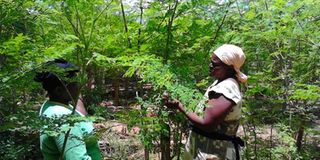Behold moringa, wonder crop that feeds my purse

Beatrice Nguru (right) and a friend in her moringa farm in Taita Taveta. PHOTO | ELIZABETH OJINA |
What you need to know:
- Beatrice Nguru grows the versatile tree on 10 acres and has found many profitable uses for it.
When sukuma wiki (collard green), maize and tomatoes failed to do well in her farm in Taita Taveta County, Beatrice Nguru turned to moringa, a crop she knew little about.
“I started growing moringa after being trained in 2006 by the Danish International Development Authority. Learning about moringa was an eye-opener,” she says.
Seven years later, Nguru is reaping the benefits of moringa, a crop that she describes as a wonder because it has offered her more than she expected.
She started with 80 moringa seedlings in her backyard, and after seeing them do well, she planted more trees on her 10 acres in Ronge, Taita-Taveta.
“So far I have over 7,000 trees,” says Nguru, a member of Mwamko Moringa Processors, an organisation that brings together 64 women, through which she has nurtured her farming.
“Moringa takes six to eight months to mature. It is fast-growing, drought-resistant and the tree remains evergreen with exceptionally nutritious leaves, pods and roots. From the root of the plant to the leaf, every part is valuable.”
Spacing the trees during planting depends on the objective of cultivating the crop.
“If you want to produce and harvest moringa seeds and leaves, space the trees 2m by 2m. For production of leafy powder, the space should be 0.5m by 1m. For production of leafy vegetables, space the trees a foot apart to make it possible to harvest the young edible shoots every two to three weeks,” Nguru explains.
HARVESTS WEEKLY
Moringa tree takes six to eight months to mature and has a lifespan of 30 to 40 years.
During the rainy season, she harvests on weekly basis while in dry spell, she harvests after two weeks.
Moringa leaves provide alternative vegetables for human consumption, she says. “They taste like spinach and their young, tender and green pods are eaten as beans.”
Its flowers can further be used as a natural pesticide.
“This tree is also capable of producing high quality fodder during the dry season. The leaves are readily eaten by cows, goats, sheep, pigs and rabbits,” she says.
She mixes fodder that she offers her two Friesian cows with moringa leaves to increase milk production and make it creamy without affecting its taste, smell and colour.
And that is not all, Nguru says she feeds her 105 kienyeji chickens moringa seeds enabling some to lay double-yolked eggs.
“When I realised how growing moringa is rewarding, I stopped farming other crops,” says the 52-year-old mother of three children who has been a small-scale farmer for many years.
“It is the source of my livelihood from which I have educated my children all who are in college and constructed a stone house.”
However, the most beneficial part of her business is adding value to moringa. She processes moringa leaves into powder and packs in plastic tins of various sizes.
“I harvest the leaves, wash and dry on a mesh in a well-ventillated room for three days,” she explains.
“Once the leaves dry, I process them using a machine into fine powder before packing into 50, 100 and 500g tins. The 50g goes for Sh150, 100g for Sh300 and 500g for Sh720,” she says, making between Sh50,000 and Sh60,000 from the products per month.
Nguru has employed three workers who help her process and package the moringa leaves.
“I used to sell my products through Mwamko Moringa Processors with other members to locals and export to Tanzania. But right now the market has expanded. There is Earthoil processing plant in Taita Taveta which buys the seeds at Sh150 a kilo,” Nguru says. Seeds of Gold caught up with her at an exhibition at Jomo Kenyatta Sports Ground in Kisumu, where she was selling the products.
Bonface Khajezo, a lecturer at Maseno University’s Botany Department, says Moringa seed powder can be used to purify dirty water.
“The protein in the seeds binds impurities causing them to aggregate and sink to the bottom. This treatment also removes 90 to 99 per cent of bacteria in water.”
Dr Pauline Andang’o, a nutrition scientist in Kisumu, says many claims on nutritional benefits of moringa remain unsubstantiated, however, studies on health benefits have shown that the crop is beneficial to animals like goats, dairy cows, rabbits and chickens.




